APL is an abbreviation, acronym, or initialism that may refer to:
APL is a programming language developed in the 1960s by Kenneth E. Iverson. Its central datatype is the multidimensional array. It uses a large range of special graphic symbols to represent most functions and operators, leading to very concise code. It has been an important influence on the development of concept modeling, spreadsheets, functional programming, and computer math packages. It has also inspired several other programming languages.

John Warner Backus was an American computer scientist. He directed the team that invented and implemented FORTRAN, the first widely used high-level programming language, and was the inventor of the Backus–Naur form (BNF), a widely used notation to define formal language syntax. He later did research into the function-level programming paradigm, presenting his findings in his influential 1977 Turing Award lecture "Can Programming Be Liberated from the von Neumann Style?"
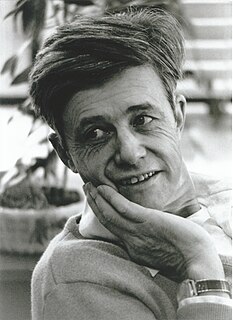
Kenneth Eugene Iverson was a Canadian computer scientist noted for the development of the programming language APL. He was honored with the Turing Award in 1979 "for his pioneering effort in programming languages and mathematical notation resulting in what the computing field now knows as APL; for his contributions to the implementation of interactive systems, to educational uses of APL, and to programming language theory and practice".

Alan Jay Perlis was an American computer scientist and professor at Purdue University, Carnegie Mellon University and Yale University. He is best known for his pioneering work in programming languages and was the first recipient of the Turing Award.

New Horizons is an interplanetary space probe that was launched as a part of NASA's New Frontiers program. Engineered by the Johns Hopkins University Applied Physics Laboratory (APL) and the Southwest Research Institute (SwRI), with a team led by S. Alan Stern, the spacecraft was launched in 2006 with the primary mission to perform a flyby study of the Pluto system in 2015, and a secondary mission to fly by and study one or more other Kuiper belt objects (KBOs) in the decade to follow, which became a mission to 486958 Arrokoth. It is the fifth space probe to achieve the escape velocity needed to leave the Solar System.
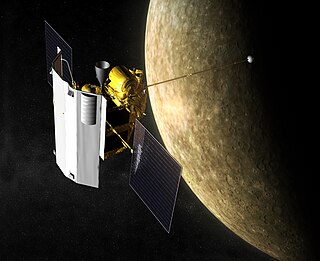
MESSENGER was a NASA robotic space probe that orbited the planet Mercury between 2011 and 2015, studying Mercury's chemical composition, geology, and magnetic field. The name is a backronym for "MErcury Surface, Space ENvironment, GEochemistry, and Ranging", and a reference to the messenger god Mercury from Roman mythology.

Roger Hui is a computer scientist and codeveloper of the programming language J.
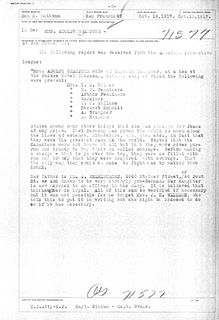
The American Protective League (1917-1919) was an organization of private citizens that worked with Federal law enforcement agencies during the World War I era to identify suspected German sympathizers and to counteract the activities of radicals, anarchists, anti-war activists, and left-wing labor and political organizations. At its zenith, the APL claimed 250,000 members in 600 cities.
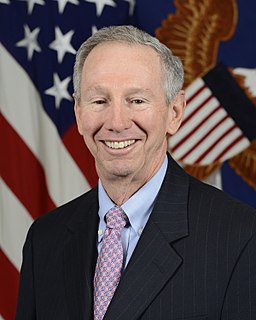
Michael Douglas Griffin is an American physicist and aerospace engineer who served as the Under Secretary of Defense for Research and Engineering from 2018 to 2020. He previously served as Administrator of NASA, the U.S. space agency, from April 13, 2005, to January 20, 2009. As NASA Administrator Griffin oversaw such areas as the future of human spaceflight, the fate of the Hubble telescope and NASA's role in understanding climate change. In April 2009 Griffin, who has an academic background, was named eminent scholar and a professor of mechanical and aerospace engineering at the University of Alabama in Huntsville.

Allan Pineda Lindo, better known by his stage name apl.de.ap, is a Filipino-American rapper, singer and record producer best known as a member of the hip hop group Black Eyed Peas.
Adin D. Falkoff was an engineer and computer systems and programming systems designer who was mostly known for his work on the programming language APL and systems for IBM.

The Johns Hopkins University Applied Physics Laboratory, commonly known as simply the Applied Physics Laboratory, or APL, located in Howard County, Maryland, near Laurel and Columbia, is a not-for-profit, university-affiliated research center employing 7200 people (2020). The Lab serves as a technical resource for the Department of Defense, NASA, and other government agencies. APL has developed numerous systems and technologies in the areas of air and missile defense, surface and undersea naval warfare, computer security, and space science and spacecraft construction. While APL provides research and engineering services to the government, it is not a traditional defense contractor, as it is a UARC and a division of Johns Hopkins University. APL is a scientific and engineering research and development division, rather than an academic division, of Johns Hopkins.

Movimiento Nacional Socialista de Chile was a political movement in Chile, during the Presidential Republic Era, which initially supported the ideas of Adolf Hitler, although it later moved towards a more local form of fascism. They were commonly known as Nacistas.
The programming language APL is distinctive in being symbolic rather than lexical: its primitives are denoted by symbols, not words. These symbols were originally devised as a mathematical notation to describe algorithms. APL programmers often assign informal names when discussing functions and operators but the core functions and operators provided by the language are denoted by non-textual symbols.
The Irish Anti-Partition League (APL) was a political organisation based in Northern Ireland which campaigned for a united Ireland from 1945 to 1958.

Eugene Edward McDonnell was a computer science pioneer and long-time contributor to the programming language siblings APL and J.
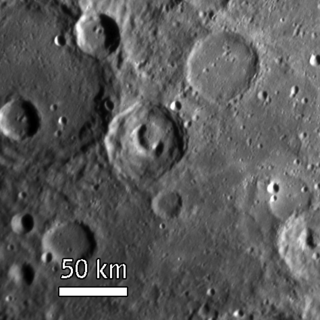
Beckett is a pit-floored crater on Mercury, which was discovered in January 2008 during the first flyby of the planet by the MESSENGER spacecraft. Its floor is not smooth and displays a telephone or arc-shaped collapse feature, which is also called a central pit. The size of the pit is 35 × 7.5 km. Such a feature may have resulted from the collapse of a magma chamber underlying the central part of the crater. The collapse feature is an analog of Earth's volcanic calderas.
The programming language APL uses a number of symbols, rather than words from natural language, to identify operations, similarly to mathematical symbols. Prior to the wide adoption of Unicode, a number of special-purpose EBCDIC and non-EBCDIC code pages were used to represent the symbols required for writing APL.

The American Party of Labor is an anti-revisionist Marxist–Leninist party in the United States. It was founded in 2008 and follows the pro-Albanian tradition, Hoxhaism.













